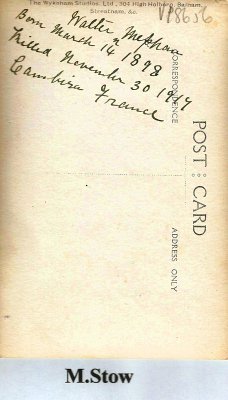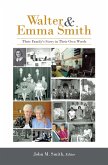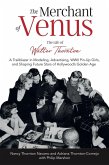The story was prompted by a postcard found amongst the papers of his late grandmother Henrietta Wells, with the starkly precise date of birth and death of Walter, killed at the First World War Battle of Cambrai.
The story is embellished by the contributions of Sir Arthur Conan Doyle (from The British Campaign in France and Flanders) and Bertrand Russell (The Ethics of War). These two literary combatants were contemporaneously implicated in the life of Walter, from the Mepham family history in Sussex, England, where Conan Doyle lived and provided encampment for soldiers travelling to the Western Front; and Holborn, London, where Russell lived at the time, and who argued for a rational individualistic pacifism.
These different actualities and historical understandings, and their influence on the families' decisions to go to war and in Harry's case to then to refuse to return to the battlefront, are fictionalised around known facts. While Russell discussed openly, and went to prison for his views, Conan Doyle reported directly from the Western Front. And for the Mepham and Wells families who were coming to terms with their own decisions and the outcomes of those deliberations: what it meant to fight a good war, for pride, for King and Country, for bread on the table; and for their parents, Caroline and father Mark Henry, as for their only children, Walter and Harry Arthur, for their children, and families yet to be born.
Dieser Download kann aus rechtlichen Gründen nur mit Rechnungsadresse in A, B, CY, CZ, D, DK, EW, E, FIN, F, GR, H, IRL, I, LT, L, LR, M, NL, PL, P, R, S, SLO, SK ausgeliefert werden.









